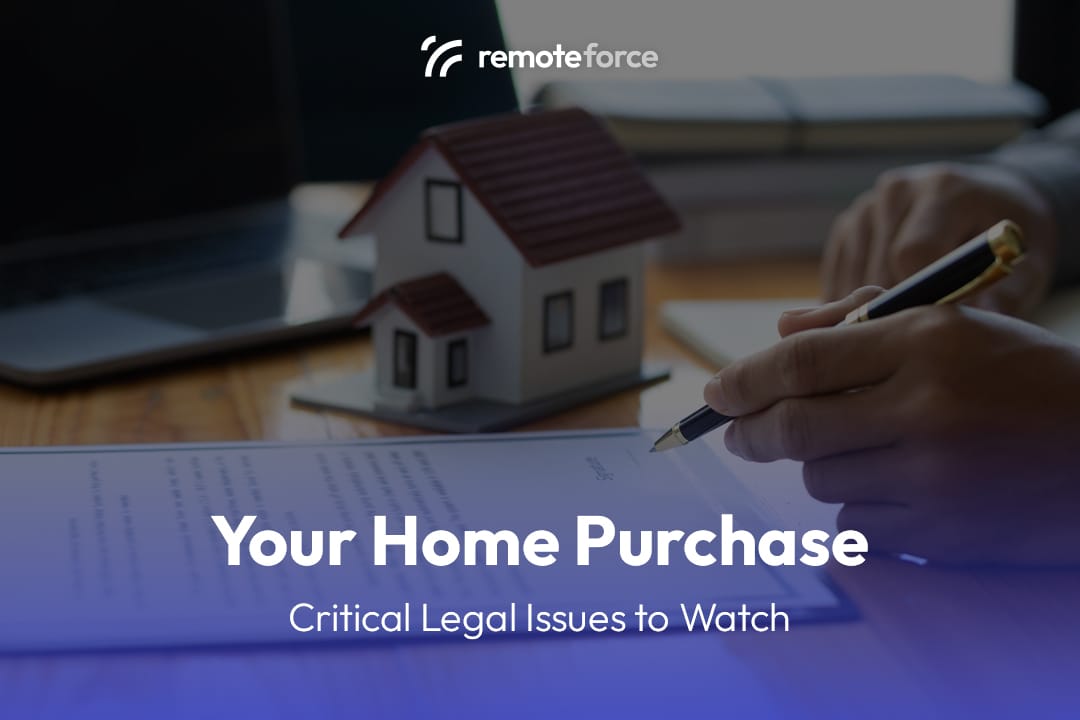Buying a house is often the biggest financial decision of your life. It’s an exciting milestone, but beneath the surface of open houses and decor dreams lies a complex web of legal issues that can easily trip up even the most prepared buyer. Overlooking these pitfalls can lead to costly delays, unexpected expenses, or even the loss of your dream home. This essential guide will walk you through the key legal considerations when buying a house, helping you navigate the process smoothly and with confidence.
Table of Contents
ToggleThe Hidden Complexity: Why Legal Vigilance is Crucial
The excitement of finding the perfect home can sometimes overshadow the critical importance of due diligence. Real estate transactions involve significant sums of money, multiple parties, and intricate legal documents. A single oversight, whether it’s a hidden lien, an unfulfilled contingency, or a misinterpretation of a contract clause, can turn your home-buying dream into a nightmare.
For instance, according to the National Association of Realtors, one of the top reasons for contract delays or cancellations is issues with financing or appraisals – but legal complexities, such as title defects or unresolved property disputes, also play a significant role. Engaging with legal services early in the process isn’t just a precaution; it’s a strategic investment in protecting your future.
Key Legal Issues to Watch Out For When Buying a House

Understanding these common legal pitfalls can empower you to ask the right questions and seek appropriate advice.
1. Title Defects and Encumbrances
The “title” to a property proves legal ownership. A title defect is anything that could jeopardize the seller’s clear ownership or your future ownership. These are often the most insidious issues because they can be hidden.
- Liens: Legal claims against a property for unpaid debts (e.g., unpaid taxes, contractor bills, child support). If a lien exists, the new owner could become responsible for that debt.
- Easements: A legal right for someone else to use a portion of your property for a specific purpose (e.g., utility companies having access to power lines, a neighbor having a right-of-way to cross your land).
- Encroachments: When a part of a structure (like a fence or shed) on an adjacent property extends onto your potential new property, or vice versa.
- Boundary Disputes: Unclear or disputed property lines that can lead to conflicts with neighbors.
- Heirship Issues: If the property is inherited, there might be disputes among heirs or unclear legal transfer of ownership.
Actionable Insight: Always insist on a title search and title insurance. A title search, conducted by a title company or attorney, investigates the property’s history to uncover any defects. Title insurance protects you (and your lender) from financial loss if a hidden defect emerges after you’ve purchased the home. Don’t skip this step!
Also Read: Founders, Don’t Sign That Deal Without Doing This First: Legal Research 101
2. The Purchase Agreement (Contract of Sale)
This is arguably the most critical document in your home purchase. It’s a legally binding contract that outlines the terms and conditions of the sale.
- Contingencies: These are clauses that must be met for the contract to be valid. Common contingencies include:
- Financing Contingency: The buyer’s ability to secure a loan.
- Inspection Contingency: The buyer’s right to have the property inspected and potentially negotiate repairs or withdraw if major issues are found.
- Appraisal Contingency: The property must appraise for at least the purchase price.
- Sale of Prior Home Contingency: The buyer’s ability to sell their current home.
- Closing Date: The agreed-upon date for the final transfer of ownership. Delays can lead to penalties.
- Fixtures vs. Personal Property: What stays and what goes? The contract should clearly define what is included in the sale (e.g., appliances, window treatments).
- Disclosures: Sellers are legally required to disclose certain known defects or issues with the property (e.g., lead paint, structural problems, past water damage). The extent of required disclosures varies by jurisdiction.
Legal Tip: Never sign a purchase agreement without having it reviewed by a qualified real estate attorney. They can explain complex clauses, add protective contingencies, and ensure your interests are fully represented. Don’t rely solely on your real estate agent, as their role is different from a legal professional’s.
3. Zoning Laws and Land Use Restrictions
You might buy a house with plans for a home office, an extension, or even just painting the exterior a specific color, only to find out it’s prohibited.
- Zoning Ordinances: Local laws that dictate how land can be used (e.g., residential, commercial, industrial). They also cover building height, setbacks, and sometimes even architectural styles.
- Homeowners Association (HOA) Rules and Covenants, Conditions, and Restrictions (CC&Rs): If the property is part of an HOA, you’re bound by its rules. These can dictate everything from paint colors and fence types to landscaping and even the number of pets you can have. Breaching these rules can lead to fines or legal action from the HOA.
Case Study Insight: A couple bought a charming house hoping to add a second story, only to discover later that local zoning laws prohibited any additions that would exceed the current height limits for the neighborhood. They faced a significant setback and had to revise their plans entirely. An attorney could have flagged this early on.
4. Property Taxes and Assessments
Understanding the current and future tax burden is crucial for budgeting.
- Assessed Value: The value assigned to your property for tax purposes. This can be different from the market value.
- Special Assessments: Additional fees levied by local authorities for specific projects (e.g., new sewer lines, road improvements) that benefit your property. These can be significant and unexpected.
Proactive Measure: Ask your real estate agent and attorney about current and projected property taxes and if there are any known or pending special assessments in the area.
5. Environmental Hazards
While often physical, these issues have significant legal ramifications regarding liability and disclosure.
- Radon, Asbestos, Lead Paint: Older homes may contain these hazardous materials. Sellers often have disclosure obligations.
- Mold and Water Damage: Can lead to health issues and structural problems, requiring costly remediation.
- Contaminated Land: Less common for residential properties, but historical use of the land could have left contaminants.
Recommendation: Always include an inspection contingency in your purchase agreement and ensure the inspection covers potential environmental hazards. If issues are found, your attorney can help negotiate repairs or a price reduction, or guide you on withdrawing from the deal.
Conclusion: Don’t Go It Alone – Seek Expert Legal Guidance
Buying a home is an exhilarating journey, but it’s one that should be navigated with knowledge and professional support. From ensuring a clear title and understanding the nuances of your purchase agreement to comprehending zoning laws and potential environmental risks, the legal complexities are undeniable. Overlooking any of these legal issues when buying a house can lead to significant financial and emotional stress.
To safeguard your investment and ensure a smooth transaction, engaging with experienced legal counsel is paramount. At RemoteForce, we understand the importance of sound legal advice in major life decisions like purchasing a home. We connect you with qualified legal professionals who specialize in real estate law, providing comprehensive support, reviewing contracts, identifying potential pitfalls, and protecting your interests every step of the way. Don’t let legal complexities derail your homeownership dreams.
Ready to ensure your home purchase is legally sound? Contact RemoteForce today to connect with a trusted real estate legal expert.



